‘Suddenly, she’s gone’: Mourning in the mud in COVID-hit Indonesia
As Indonesia’s most populous island deals with its largest surge in COVID-19, families say goodbye to their loved ones in makeshift cemeteries.
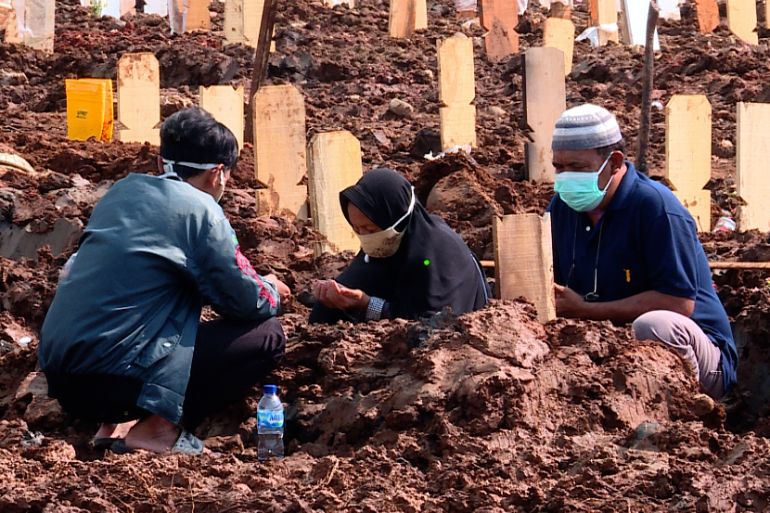
Jakarta/Kudus, Indonesia – It should have been a time of celebration for Puji Apriani’s family – she was pregnant with her second child, and just weeks away from giving birth.
But instead of welcoming a new life, her family is now in mourning.
Keep reading
list of 4 items‘The virus knows no borders. Neither should our solidarity’
‘It will get very bad’: Experts warn on Indonesia COVID surge
Dengue fever cut by 77% in groundbreaking mosquito trial
“I miss her. She was healthy, her pregnancy was normal. And suddenly, she’s gone,” her younger sister Ery Jurniastuti said.
The family lives in Kudus, Central Java – one of the worst affected areas by Indonesia’s recent surge in COVID-19 cases.
“She felt out of breath, and she was coughing. She felt contractions in her stomach, too,” Ery said.
Home to almost 900,000 people, Kudus has recorded a 7,594 percent increase in cases since the beginning of this year.
Following a steep rise in cases this month, overwhelmed hospitals have been forced to turn patients away.
After being rejected by two hospitals, Puji was finally admitted, and her oxygen levels increased slightly.
But it was too late. Her condition deteriorated and she died in hospital.
“She died first, then they checked the heart of the baby. The baby is still inside, they didn’t take it out. It died there.”
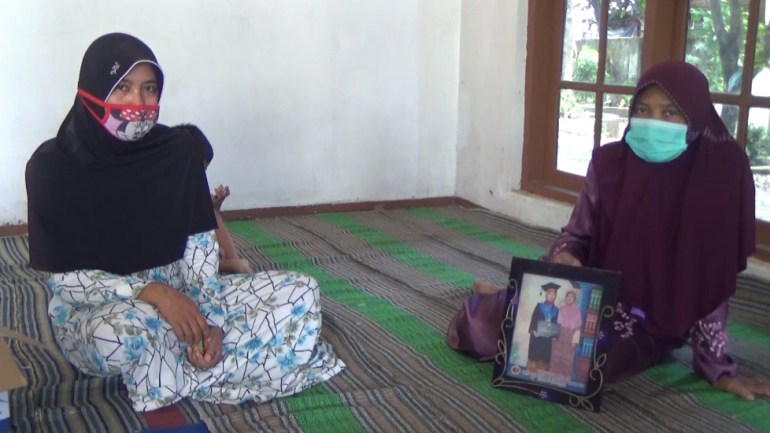
Doctors vs Delta
At the Loekmono Hadi General Hospital in Kudus, Dr Abdul Aziz Achyar said he was “surprised” by the ferocity of the surge, which has pushed bed occupancy rates in hospitals to more than 90 percent.
“During Ramadan, it was so quiet. We only had 18 patients. But then, when it started … I myself was also hospitalised,” he told Al Jazeera.
One hundred fifty-three of his colleagues also contracted the virus, and two of them died.
Indonesia’s capacity to track variants is limited, but doctors believe the current outbreak in Kudus is driven in part by the spread of the Delta variant, which was first detected in India.
“We sent cases from health centre [for genome sequencing]… from 72 samples, 62 were the new variant,” Dr Abdul said.
At Aisyiyah Kudus Hospital, Dr Najib Budhiwardoyo said his hospital is completely at capacity.
“We are full of COVID patients. This second wave started after Eid,” he said.
“All hospitals in Kudus are experiencing this problem … oxygen scarcity. We have to be selective; we can only use oxygen for patients with very low saturation.”
Swamp turned cemetery
It is not just the hospitals in Java that are close to capacity, but cemeteries too.
In the Indonesian capital, the designated COVID-19 burial sites, such as Pondok Rangon Cemetery, that were opened in the early months of the pandemic are already full.
Cemetery workers told Al Jazeera they are struggling to keep up with their workload.
“Before COVID, I used to dig 10 graves each day. But yesterday, we dug 46 graves. The day before, it was 51,” Darsiman, a gravedigger of 20 years, said.
“We are very tired. We work from morning until night.”
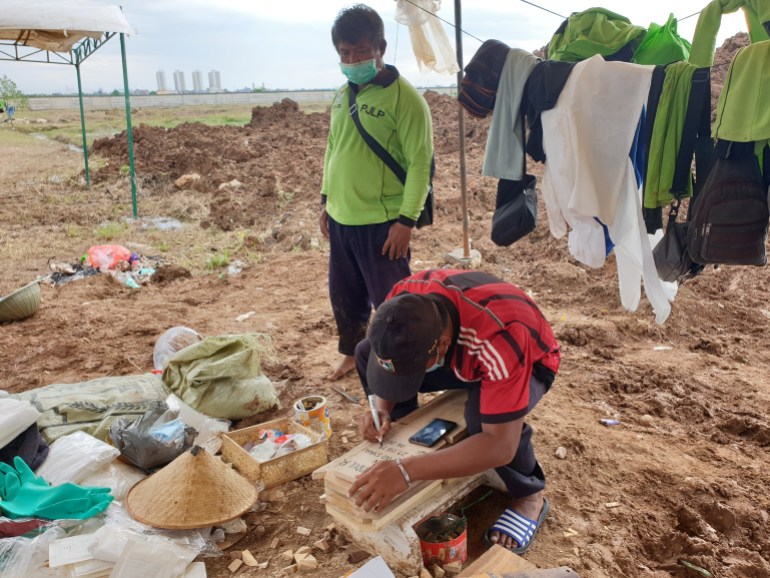
In Rorotan, North Jakarta, a new burial site for those who have died from COVID-19 opened just weeks ago – and already, more than 800 people have been buried there.
As the death toll continues to rise, finding room for the dead in this densely packed city is becoming a challenge.
The land at Rorotan used to be an empty swamp – the families of the deceased have to trek through the mud, to pay respects to their loved ones.
“This is a new cemetery … the other locations are full. There are just so many COVID cases, so they have to bring them here,” Darsiman said.
“It’s been raining so it’s muddy. It’s very sad to see funerals here, even the ambulances get stuck trying to come in.”
Headstone writer Wahyudin said his workload has increased because of the pandemic – and working at the cemetery takes an emotional toll.
“I feel so sad seeing this many burials. Seeing those families cry, I think about my own family,” he said.
“Before COVID, I also made headstones but it’s busier now. So many people have died.”
Moments to rest are scarce – just as workers lower a plastic-wrapped coffin into the ground, more ambulances arrive, with more dead to bury.
‘India should be our lesson’
This week, Indonesia surpassed two million confirmed cases of coronavirus – and more than 55,000 confirmed deaths.
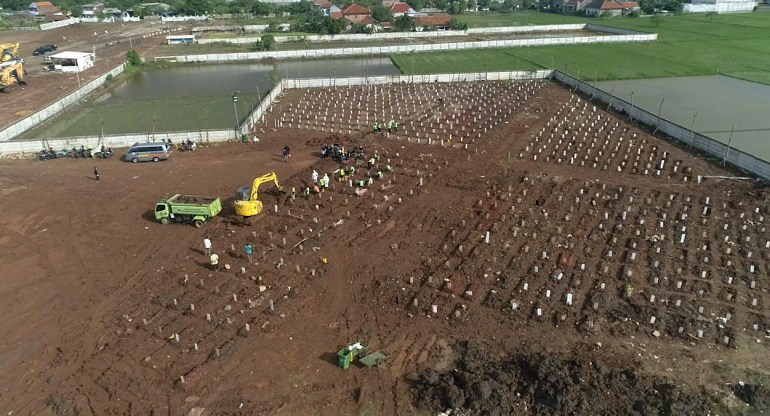
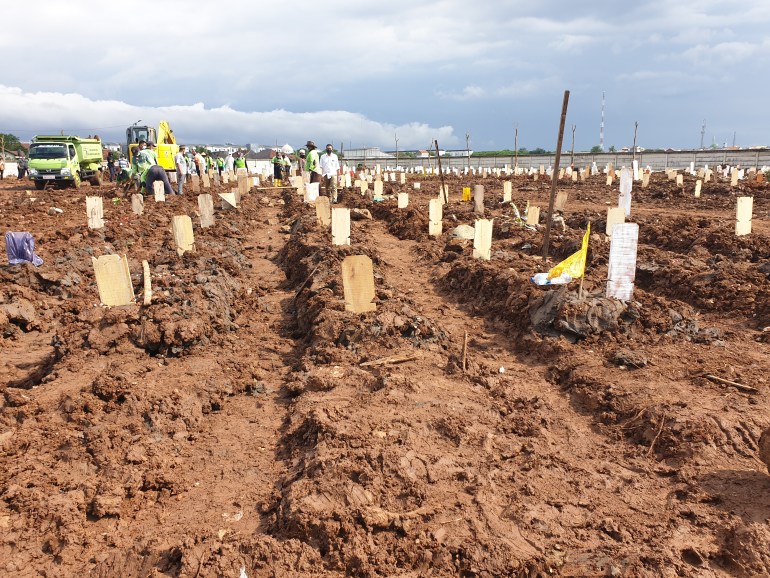
Dr Nadia Siti, the head of Infectious Diseases at the Ministry of Health, said the rise in cases is not surprising.
“We know that if there is a holiday or event, there is an increasing number of people moving and travelling from other cities,” she said.
“The government had restrictions on mudik, which is the tradition of Muslims to visit their hometown [during Eid Al Fitr]. Still, there are four to six million people who travelled.”
The situation in Kudus and capital are of particular concern to the Ministry of Health, where bed occupation rates are high and hospital workers are already overwhelmed by the crisis.
“In Jakarta, the bed occupation rate is almost 80 to 90 percent. We instruct hospitals to convert their beds into COVID-19 services, so they can be available for patients,” she said.
“The last strategy is to establish field hospitals with the coordination of the army or police.”

Long before the pandemic, Indonesia had a shortage of medical professionals – and there are concerns about how its stretched healthcare system will cope when infections are expected to peak in July.
“With the existing doctors, paramedics and nurses, it might not be enough. We might need an experienced doctor to supervise five or 10 new ones, who don’t have experience in taking care of patients,” Dr Nadia said.
“We do hope we won’t face the same situation like India. What happened in India should be our lesson.”
Jamaah contributed reporting from Central Java.